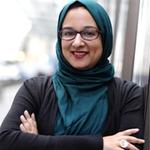'It's Impossible to Hate Someone Whose Story You Know' – Talking With Salma Hasan Ali
Lifestyle
|
Jun 3, 2021
|
9 MIN READ
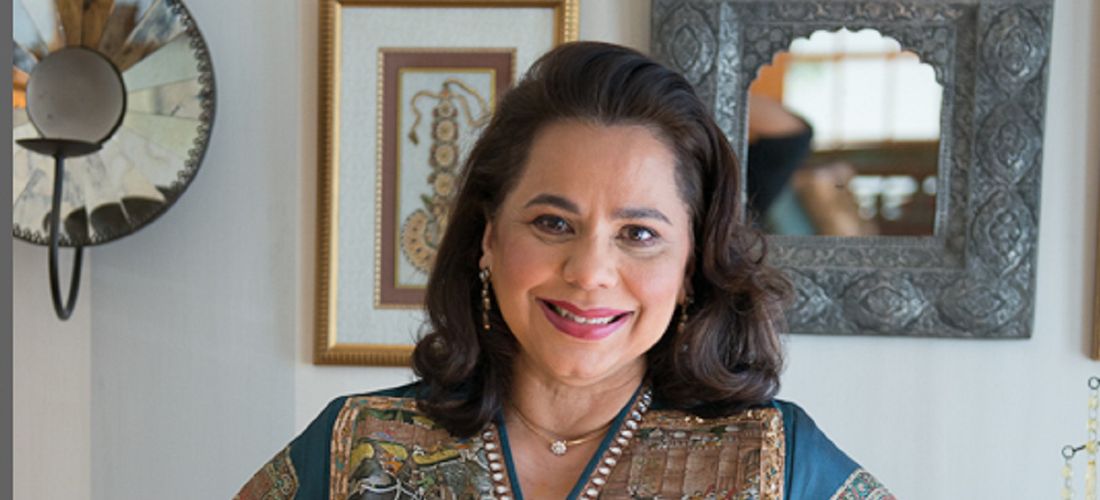
Salma Hasan Ali; image source: Aeysha Chaudhry
What is the power of storytelling, and is it truly possible to build meaningful connections with others by sharing one’s own experiences? Salma Hasan Ali – author, storytelling consultant and Chief Inspiration Officer and Board Vice President of KindWorks – didn’t set out to answer this question when she began her 30 Days blog ten years ago in Ramadan. Back then, with two young children, Salma simply wanted to bring more meaning to the holy month for her children beyond the practice of fasting.
But as she continued to blog in subsequent Ramadans (after looping her children into exploring different aspects of the fasting month in its early years) the scope of the blog grew (as did her children). “The word just got passed around, Salma says. “I was getting messages from non-Muslims in particular, and I realized there was an audience of non-Muslims and people of no faith, so I broadened the scope.”
Ten years later, spurred on by more than 300 stories of good deeds, gratitude, du’as, recipes, traditions, the wisdom of elders, refugee stories and more, Salma has compiled the best of her blog stories into a gorgeous limited edition book, 30 Days: Stories of Gratitude, Traditions, and Wisdom. I recently sat down with Salma over Zoom to talk about her book, the stories that have stayed with her, the wisdom of her father and what inspired her to create a book out of the blog posts that live on her website.
This obviously has been a passion project – more than a passion project – for 10 years. Why did you decide to take something from a digital platform and turn it into a book?
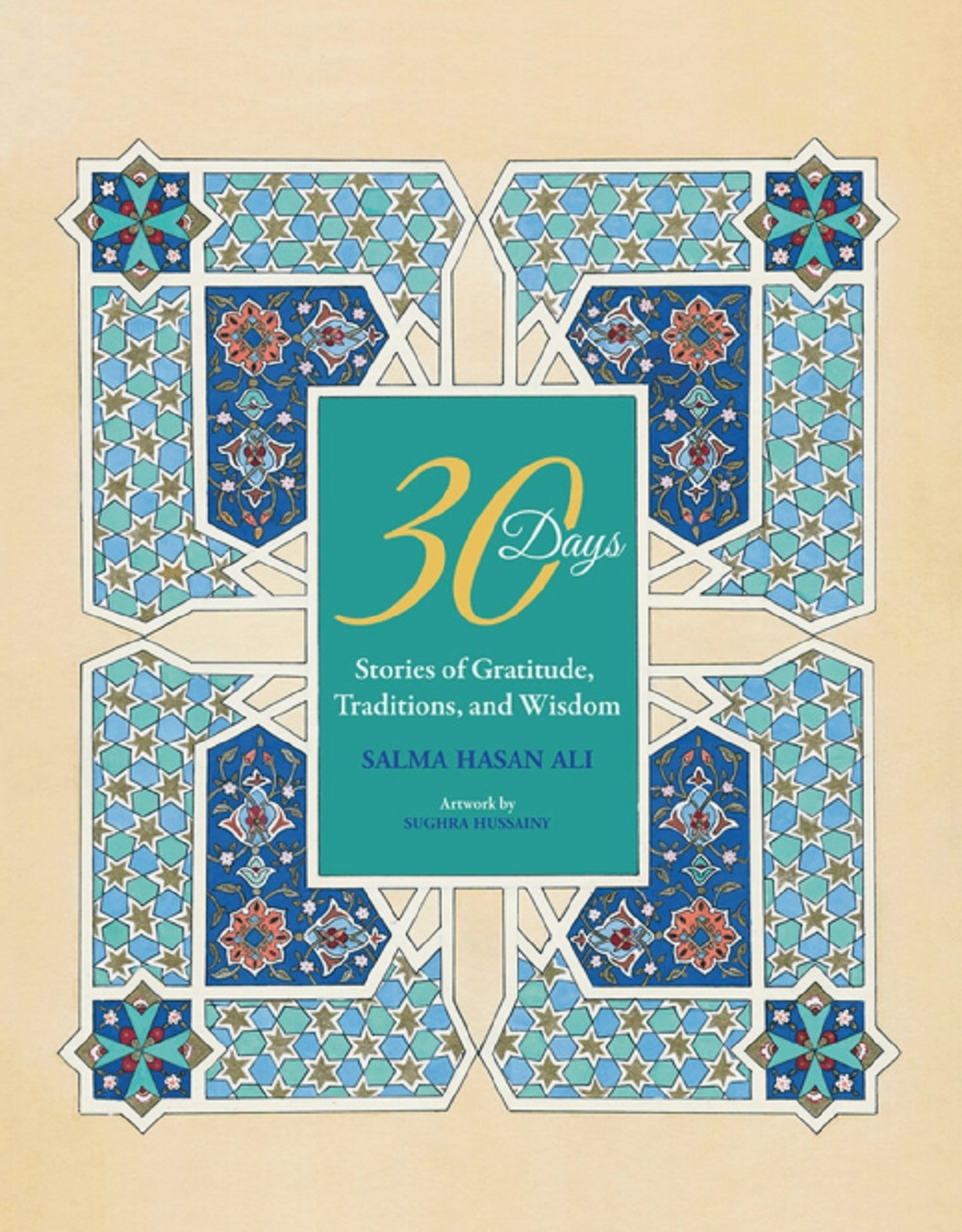
The cover of Salma's book; image source: Salma Hasan Ali
This year is the tenth anniversary of the "30 Days" blog. While I had been thinking about producing a commemorative book it wasn't until I met an amazing Afghan artist named Sughra Hussainy that I was convinced. A friend of mine connected me with Sughra, who was looking for a job and a place to live, and my friend thought I could help in some way. As I got to know Sughra I learned that she specializes in miniature paintings, illuminations, and calligraphy and that she had been invited by the Smithsonian Museum in Washington D.C. to exhibit her artwork.
Her art fits beautifully with the themes of the "30 Days" project so I thought one way to support her efforts and share her story would be through collaborating on a book.
I wanted the production of the book to be unique too. I asked Shahidul Alam, a renowned photographer, journalist and activist in Bangladesh, if his media organization would take on this project. They agreed, and designed a beautiful layout and produced handmade books. Each book was hand stitched by craftsmen in Dhaka.
So why now? What was the impetus to create and produce this book so quickly?
I am passionate about the power of our stories to connect people, to build relationships and friendships. I feel that as we are emerging out of this year of isolation, disconnection and loneliness, this book can [help us to] open us up and reconnect with each other even more deeply.
The purpose of the book is broader. The audience is everyone. It’s not a book about Ramadan or just for Muslims.
This book stemmed from you wanting to teach your children something deeper about Ramadan. How did it evolve from there?
Ten years ago my son Zayd was 9, and my daughter Saanya was 15. They weren’t fasting through the whole month, but I wanted them to know this month was very important and special, and there are so many things you could do in addition to fasting. One of these important things is doing good. So that first year we decided we would do one good deed each day, and we would blog about it to keep us accountable. We called it “30 Days, 30 Deeds.” Each day we’d come up with something, not some huge big project to save the world, but something for our family, for our community, for our neighbors.
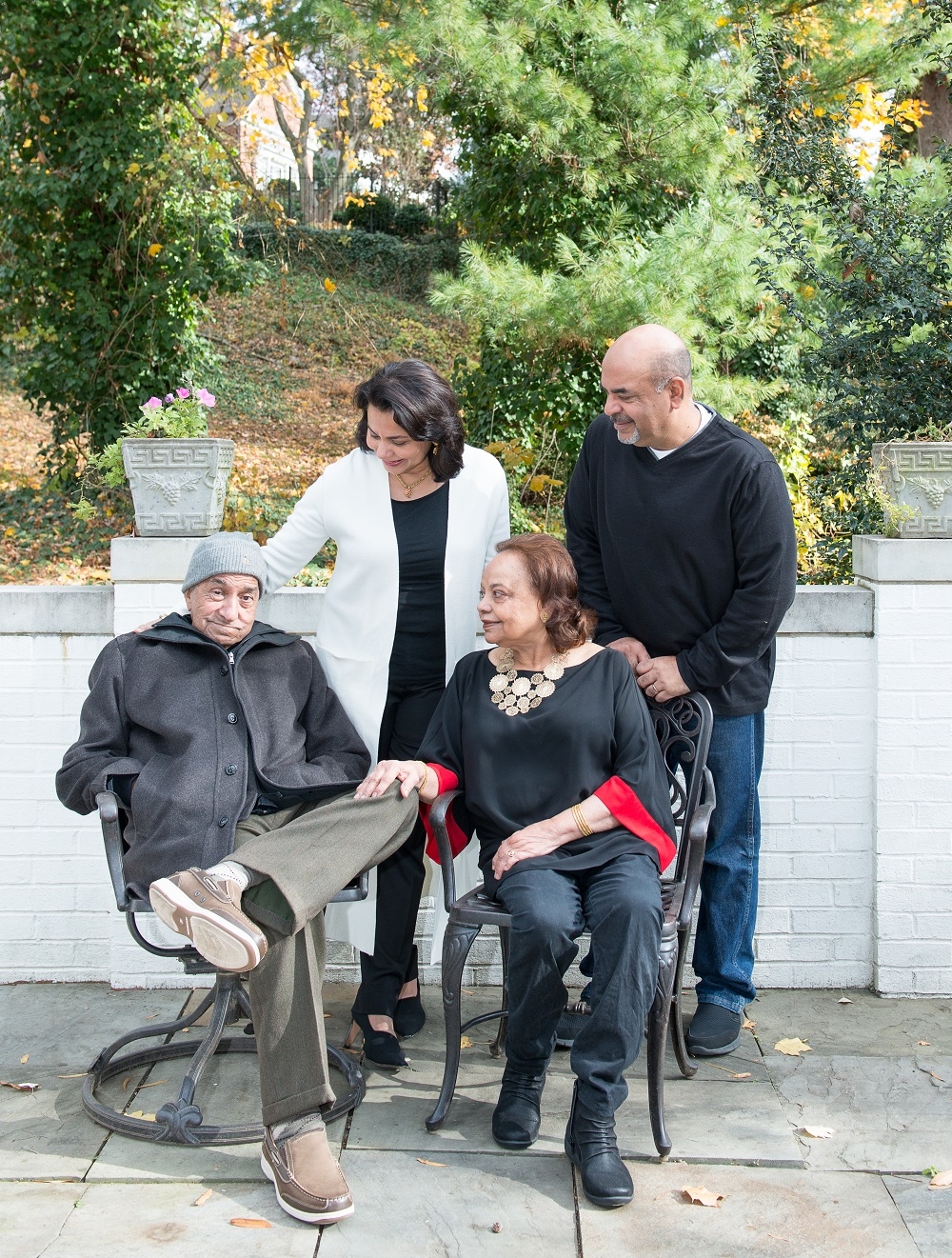
Salma and her parents. Image source: Aeysha Chaudhry
My parents were visiting, and [my children] spent a lot of time with them listening to their stories, making samosas with them. I taught them that this was also doing good. We baked cookies for our neighbors, we served meals at the shelter, we hosted an interfaith iftar. And, we blogged about it. Sometimes I [wrote], sometimes the kids did. It was just a family project. The next year Ramadan came, and we thought we’d do it again, so we chose 30 gratitudes [where we shared daily] something we were grateful for.
The first few years the kids were very much involved. Then they became teenagers, and it was harder to keep them engaged. And, I also wanted to broaden the scope of it.
The blog started growing in terms of readership. People all over the world were tuning in. I was getting messages from non-Muslims in particular, and I realized there was an audience of non-Muslims and people of no faith.
Each year you hosted the 30 days of reflections, there were different themes. How did you choose these themes, and what were some of your favorites?
We started with 30 deeds. Then 30 gratitudes, 30 du’as, 30 traditions, 30 recipes, 30 inspiring stories, 30 refugee stories, 30 wisdoms from our elders (my favorite), 30 reflections for our times and finally, Ramadan in a pandemic.
The first few years [readers] got to meet a Muslim family through our stories. As the years progressed, I decided to also share positive stories about Muslims through the blog, to counter the largely negative focus around Muslims in the media. So, I ended up making the blog a way to highlight some of those stories. I was meeting a lot of interesting Muslims – humanitarians, musicians, and people who were doing good in whatever field [they were in], who happened to be Muslim.
[I met Abdul Sattar] Edhi sahab – my favorite humanitarian. I had a chance to interview him in Pakistan and feature him on the blog. [I also met] Dr. Shershah Syed, a Pakistani physician- who treats fistulas. And I thought, how amazing to share the story of this male Muslim South Asian doctor taking care of such a sensitive women’s issue. That’s going to totally disrupt perceptions that people may have.
One thing that stayed [consistent] throughout the blog is that it wasn’t a research-based blog. It was a personal blog. [It was about] people I had met, who I happened to meet during that [particular] Ramadan or I had met [at some other point]. The blog [and book] throughout has been very personal.
How did you cull from about 300 essays to pick the ones that went into this book?
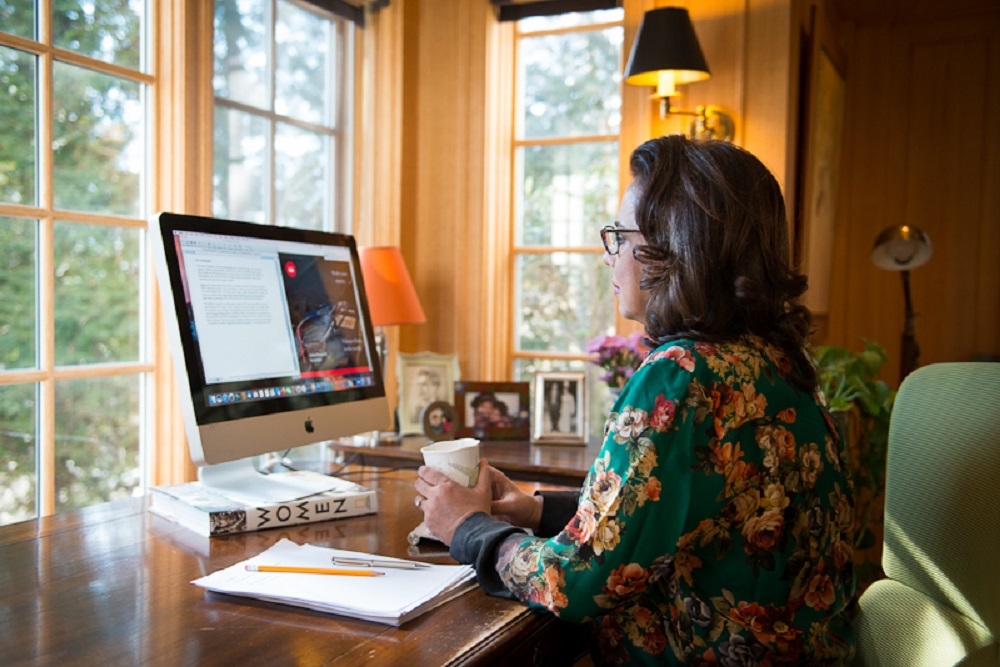
Salma in her office working. Image source: Aeysha Chaudhry
There are 100 essays in the book. I could not narrow it down to 30! A couple of them I combined into one, and all the themes are represented. The 30 inspiring stories and 30 refugee stories are combined. And, there are more stories from the “30 wisdoms” than other themes. I especially enjoyed the theme, "wisdom from our elders." It was wonderful to hear the wisdoms that people keep close to heart, that guide them and provide them comfort.
What are your favorite wisdoms from elders, Salma?
Just a few weeks before Ramadan, my father passed away. It continues to be heartbreaking. I’ve learned so much from him. My father loved dessert. Growing up, he would go to work, and he would have this briefcase. Whenever there was an office party the sheetcake would come. He would get his piece, wrap it in a napkin and bring it home for me. After dinner he’d present this piece of cake. I’d be so excited and delighted. This surprise frosted cake! For him, seeing me enjoy eating the cake was so much more delicious than him eating. It encapsulates who he was.
The enjoyment he got from making other people happy; the generosity of spirit. I share that.
The other wisdom is from my mother. I was in college, and I was kind of a nerd in high school, very shy, very reserved. I just kind of had my straight A’s. That was my thing. I took astronomy, because I had to do a science requirement in college, and I got my final exam back, and I got a C+. I was devastated. I went home and collapsed on my mom’s bed and was beside myself. How could this happen? She let me go on and on and then said, ”Beta, Allah (S) has to sprinkle His favors on everyone. He can’t make you good in English, good in history, good in math AND good in astronomy."
Tell me about some of your favorite stories from this book. Which ones have really stuck with you at different points in your life?
As I was going through these 300+ posts, I had never read them sequentially from the beginning to the end. I realized there was one thread that had gone through them all – and that was my father. My father was the most amazing storyteller. He remembered so much detail and told it with so much fervor. As I was reading all these posts, I realized his stories are very much a part of this book.
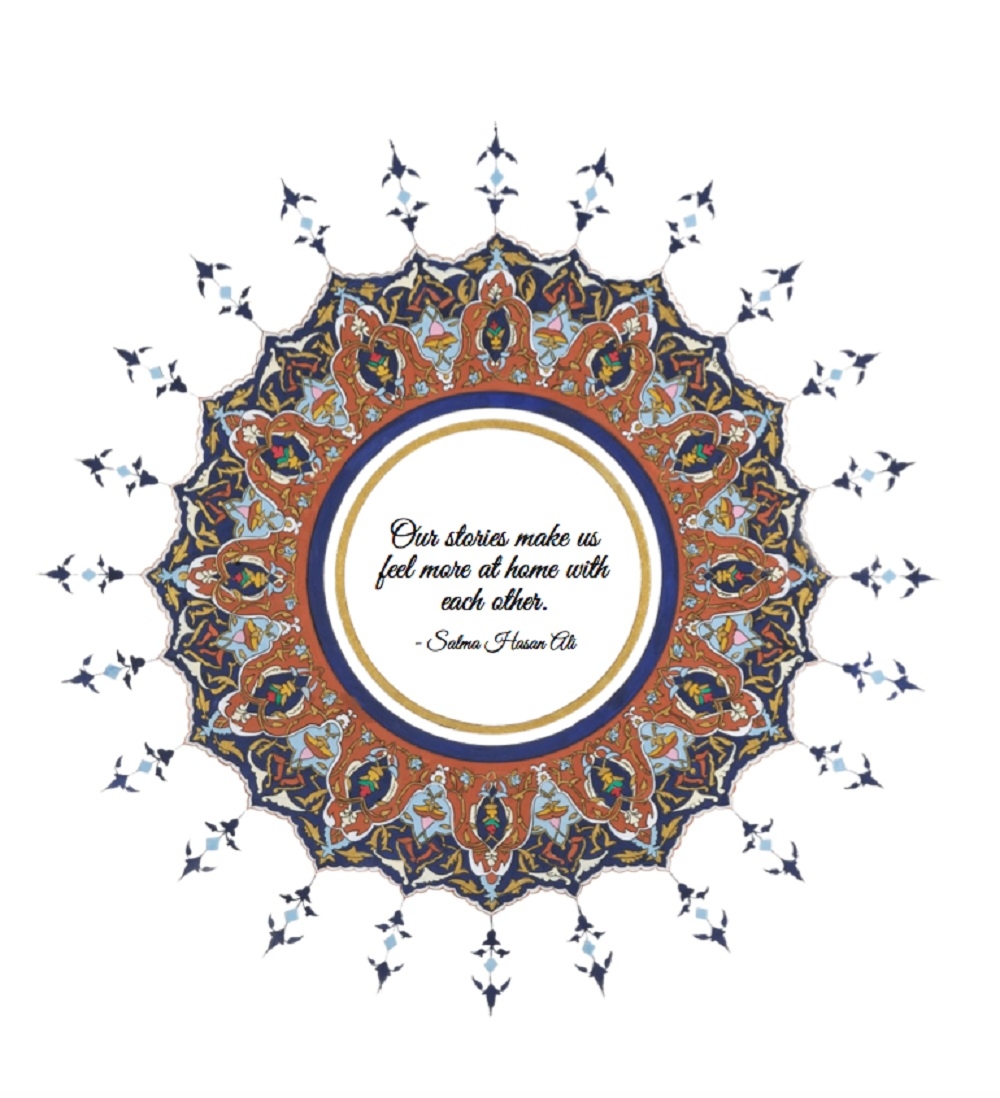
A page out of Salma's book.
This book is a chronicle of our family’s story. But it’s also why I think capturing our stories is so important. When someone you love passes away, it’s their stories that you have. We are all mortal, but those stories live on. I’m so glad I listened to my dad and wrote down some of his stories. What I want people to take away from this book is how important it is to share our family’s stories.
You want this book to facilitate discussions about common topics. What do you mean by that?
This is the call to action in this book. At the end of the book there is an envelope with four postcards, and you can share a story with someone. We need to be a little more open and vulnerable and willing to share. The connection forms immediately, and anything that may separate us from one another – our skin color, our faith, or political ideology – it doesn’t matter. We are connecting human to human. When the bond [of our shared humanity] is made, then you can deal with whatever else you need to deal with.
Something that I remember reading that guides my storytelling is that it’s impossible to hate someone whose story you know.
How important is our ability to engage with each other as a collection of different communities?
Let me share one powerful example, which is in the book as well.
I wrote an article years ago, a kind of “day in the life of our family in Ramadan” [for a publication]. It was a very straightforward article. A woman found that article and read it. She googled me, found me on Facebook and reached out to me. She said, “Excuse my intrusion into your privacy, but I am a Christian woman with the church as my core. I raised my children within the church. And my 19-year-old daughter has just told me she wants to convert to Islam. I am scared, I am terrified, I am searching for answers.”
Imagine this woman – she is in a state of absolute shock and fear because her daughter wants to convert to a faith that all she sees in the media [as being] negative.
I write back, and I give her some ideas of books to read, people to connect to. We start this virtual journey of holding hands. Her daughter does convert to Islam, she starts wearing hijab, she meets a Muslim man, she travels to Turkey.
This woman was a devout Christian. It was very much at the core of her everything. When I wrote that “day in the life of Ramadan,” I had no idea that it would impact anybody. But, someone who needed to read a relatable, familiar story read it at the right time. That was about seven years ago. We have continued on [with our] friendship virtually.
Last year she drove from New Jersey to Washington, D.C. with her daughter to attend a KindWorks event, so we met. And now this woman who previously didn't know much about Islam, and what she did know was largely negative, shares the Islam that she's come to know through her own personal experiences. And that’s it – that’s the power of a story and the ripple effects of it.
Learn more about Salma Hasan Ali’s book, her blog and her volunteer organization, KindWorks, here. You can purchase her book here.
Subscribe to be the first to know about new product releases, styling ideas and more.
What products are you interested in?

